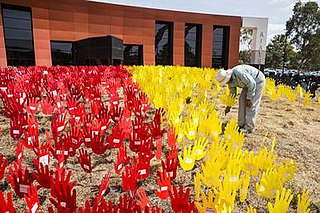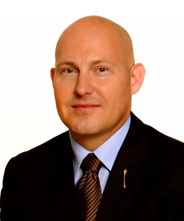
The Aboriginal and Torres Strait Islander Commission (ATSIC) (1990–2005) was the Australian Government body through which Aboriginal Australians and Torres Strait Islanders were formally involved in the processes of government affecting their lives, established under the Hawke government in 1990. A number of Indigenous programs and organisations fell under the overall umbrella of ATSIC.

Lowitja Lois O'Donoghue Smart, AC, CBE, DSG is an Aboriginal Australian retired public administrator. In 1990-1996 she was the inaugural chairperson of the Aboriginal and Torres Strait Islander Commission (ATSIC). She is patron of the Lowitja Institute, a research institute for Aboriginal & Torres Strait Islander health and wellbeing.
The Office of Indigenous Policy Coordination (OIPC) was the Australian Government-led unit for the coordination of policy, programs and services for Indigenous Australians from July 2004 to August 2011.

The Australian Institute of Aboriginal and Torres Strait Islander Studies (AIATSIS), established as the Australian Institute of Aboriginal Studies (AIAS) in 1964, is an independent Australian Government statutory authority. It is a collecting, publishing and research institute and is considered to be Australia's premier resource for information about the cultures and societies of Aboriginal and Torres Strait Islander peoples. The Institute is a leader in ethical research and the handling of culturally sensitive material and holds in its collections many unique and irreplaceable items of cultural, historical and spiritual significance. The collection at AIATSIS has been built through over 50 years of research and engagement with Aboriginal and Torres Strait Islander communities and is now a source of language and culture revitalisation, native title research and family and community history. AIATSIS is located on Acton Peninsula in Canberra, Australian Capital Territory.
Aboriginal and Torres Strait Islander Services was part of the now disbanded Aboriginal and Torres Strait Islander Commission (ATSIC).
An outstation, homeland or homeland community is a very small, often remote, permanent community of Aboriginal Australian people connected by kinship, on land that often, but not always, has social, cultural or economic significance to them, as traditional land. The outstation movement or homeland movement refers to the voluntary relocation of Aboriginal people from towns to these locations.

The Department of Health is a department of the Government of Australia charged with overseeing Australia's health system that is administered by State and territory governments. It supports universal and affordable access to medical, pharmaceutical and hospital services, as well as helping people to stay healthy through health promotion, participation and exercise and other disease prevention activities.
The Department of the Prime Minister and Cabinet (PM&C) is an Australian Government public service central department of state with broad ranging responsibilities, primary of which is for intergovernmental and whole of government policy coordination and assisting the prime minister of Australia in managing the Cabinet of Australia. The PM&C was established in 1971 and traces its origins back to the Prime Minister's Department established in 1911.
Indigenous Australian self-determination, also known as Aboriginal Australian self-determination, is the power relating to self-governance by Aboriginal and Torres Strait Islander peoples in Australia. It is the right of Aboriginal and Torres Strait Islander peoples to determine their own political status and pursue their own economic, social and cultural interests. Self-determination asserts that Aboriginal and Torres Strait Islander peoples should direct and implement Aboriginal and Torres Strait Islander policy formulation and provision of services. Self-determination encompasses both Aboriginal land rights and self-governance, and may also be supported by a treaty between a government and an Indigenous group in Australia.
The National Indigenous Council (NIC) was an appointed advisory body to the Australian Government through the Minister's for Indigenous Affairs' Taskforce on Indigenous Affairs (MTIA) established in November 2004, and wound up in early 2008. It was chaired by Sue Gordon, a Western Australian magistrate.
Wilfred James "Bill" Gray is a former senior Australian public servant, and specialist in Aboriginal affairs.

The Torres Strait Regional Authority is an Australian Government body established in 1994 to administer the Torres Strait Islands. It consists of 20 elected representatives. The primary function of the authority is to strengthen the economic, social and cultural development of the peoples of the Torres Strait area.

Curtis Warren Pitt is an Australian politician who has been a Labor Party member of the Legislative Assembly of Queensland since 2009, representing the district of Mulgrave. On 14 February 2015, he was sworn in as Treasurer of Queensland.
The Aboriginal Medical Services Alliance Northern Territory (AMSANT) is a healthcare policy organisation that serves Aboriginal communities in Australia's Northern Territory. It is an independent, not-for-profit group that is funded by Australia's federal government, the Northern Territory Government and charities and non-governmental organisations.
The Department of Social Security was a government department in Australia, which administered the Social Security system between 1972 to 1998. The Department was one of several new departments established by the Whitlam Government and was managed by the Minister for Social Security.
The Department of Health and Aged Care was an Australian government department that existed between October 1998 and November 2001.
The Community Development Employment Projects (CDEP) was an initiative by the Australian Government for the employment of Aboriginal and Torres Strait Islander people It provided a flexible basic income support.
The Department of Health and Family Services was an Australian government department that existed between March 1996 and October 1998.
The Closing the Gap framework is an Australian government strategy that aims to reduce disadvantage among Aboriginal and Torres Strait Islander people, based on seven targets. From adoption in 2008, after meetings with the Close the Gap social justice campaign, until 2018, the federal and state and territory governments worked together via the Council of Australian Governments (COAG) on the framework, with the Department of the Prime Minister and Cabinet producing a report at the end of each year analysing progress on each of its seven targets.
The Congress of Aboriginal and Torres Strait Islander Nurses and Midwives (CATSINaM) is the peak national body that represents, advocates for and supports Aboriginal and Torres Strait Islander nurses and midwives in Australia. The organisation is located in Canberra, in the ACT.





